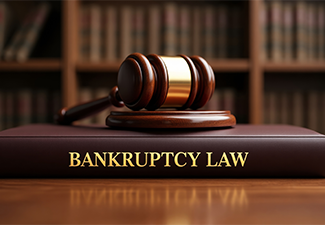Converting Between Bankruptcy Chapters: Implications and Strategies
Aug. 28, 2025
 Financial hardships can strike anyone, and when they do, bankruptcy might offer the relief you need. However, choosing the right bankruptcy chapter isn't always straightforward—and sometimes, your initial choice might not work out as planned. That's where the ability to convert between bankruptcy chapters becomes invaluable.
Financial hardships can strike anyone, and when they do, bankruptcy might offer the relief you need. However, choosing the right bankruptcy chapter isn't always straightforward—and sometimes, your initial choice might not work out as planned. That's where the ability to convert between bankruptcy chapters becomes invaluable.
At Vivona Pandurangi, PLC, we understand that bankruptcy laws can feel overwhelming, especially when you're already dealing with financial stress. Our experienced attorneys have spent years helping individuals and businesses throughout Virginia find the best path forward through bankruptcy proceedings. We serve clients across Falls Church, Alexandria, Arlington, Fairfax, Manassas, Prince William, and Loudoun, bringing both legal knowledge and compassionate guidance to each case.
Converting between bankruptcy chapters is a complicated process that requires careful consideration of timing, eligibility requirements, and potential consequences. Without proper legal guidance, you might miss opportunities for better outcomes or accidentally harm your financial recovery. We're here to help you understand your options and make informed decisions that protect your future.
Understanding Bankruptcy Chapter Conversions
Bankruptcy conversions allow debtors to switch from one chapter of bankruptcy to another during their case. This flexibility exists because circumstances change, and what seemed like the right choice initially might not serve your best interests as your case progresses.
The most common conversions involve moving between Chapter 7 (liquidation), Chapter 11 (reorganization for businesses and high-asset individuals), and Chapter 13 (wage earner's plan). Each chapter serves different purposes and offers distinct advantages depending on your financial situation, assets, and long-term goals.
Chapter 7 bankruptcy provides quick debt discharge but requires liquidating non-exempt assets. Chapter 13 allows you to keep your property while following a three-to-five-year repayment plan. Chapter 11, while primarily for businesses, can also help individuals with substantial assets or debts that exceed Chapter 13 limits.
When to Consider Converting Your Bankruptcy Case
Several situations might prompt a conversion. If you filed Chapter 13 but your income dropped significantly, making your payment plan impossible to maintain, converting to Chapter 7 might provide better relief. Conversely, if you filed Chapter 7 but discovered you have more assets than initially thought, Chapter 13 could help you keep your property.
Sometimes, new information emerges after filing. You might learn about additional debts, discover assets you forgot to list, or realize your income situation is different from what you initially calculated. These discoveries could make a different chapter more advantageous.
Business owners often start with Chapter 11 but find the costs and process difficult to manage. Converting to Chapter 7 might be more practical if the business cannot be saved. Alternatively, individuals who filed Chapter 7 might discover they can afford a payment plan and want to keep their home, making Chapter 13 conversion attractive.
The Conversion Process and Requirements
Converting between chapters isn't automatic—it requires filing a motion with the bankruptcy court. The process involves several steps and specific requirements that vary depending on which chapters you're converting between.
For voluntary conversions, you typically have the right to convert your case once, but restrictions apply. You cannot convert from Chapter 7 to Chapter 11 or 13 if you've already converted to Chapter 7 from another chapter, received a Chapter 7 discharge within the past eight years, or received a Chapter 13 discharge within the past six years.
The timing of your conversion matters significantly. Converting too late in the process might limit your options or create complications. Converting too early might mean missing opportunities that could have developed in your original chapter.
Administrative requirements include updating your schedules and statements, paying additional filing fees, and potentially completing new credit counseling requirements. The court will also review your eligibility for the new chapter, which means meeting income requirements, debt limits, and other statutory criteria.
Virginia Laws Affecting Bankruptcy Conversions
Virginia state law intersects with federal bankruptcy law in several important ways that can affect conversion decisions. Virginia's exemption laws determine which assets you can protect in bankruptcy, and these exemptions might influence whether conversion makes sense.
Virginia allows debtors to choose between state exemptions and federal bankruptcy exemptions, but you must stick with one system throughout your case. This choice can significantly impact conversion strategies. Virginia's homestead exemption protects up to $25,000 of home equity for individuals ($50,000 for married couples), while the federal exemption is currently higher but might not be available if you haven't lived in Virginia for the required time period.
Virginia's wage garnishment laws also play a role in conversion timing. State law limits garnishments to 25% of disposable earnings, but bankruptcy's automatic stay provides broader protection. If you're facing garnishment, the timing of conversion could affect how much protection you receive.
The state's preference payment laws can also influence conversion decisions. Virginia follows federal preference law, which means payments made to creditors within 90 days before filing (or up to one year for insiders) might be recoverable by the trustee. Converting chapters might affect how these payments are handled.
Strategic Considerations for Different Conversions
Converting from Chapter 13 to Chapter 7 often occurs when debtors cannot maintain their payment plans. This conversion can provide faster debt relief but means losing the protections that Chapter 13 offered for non-exempt assets. You'll also lose the ability to catch up on secured debt payments through the plan.
Converting from Chapter 7 to Chapter 13 is less common but can be valuable when you want to save your home from foreclosure or your car from repossession. This conversion allows you to propose a payment plan to catch up on past-due payments, but you must qualify for Chapter 13's debt limits and income requirements.
Chapter 11 conversions require careful analysis of costs versus benefits. Converting to Chapter 7 eliminates ongoing administrative costs but means liquidating assets. Converting to Chapter 13 (for individuals) can provide similar reorganization benefits at lower costs but has strict debt limits.
Financial Implications of Converting
Conversion affects your financial obligations in several ways. Additional filing fees apply—currently $75 for most conversions. You might also face new attorney fees, trustee fees, and administrative costs depending on the new chapter's requirements.
Your credit report will reflect the conversion, potentially affecting your credit score differently than completing your original chapter. The timing of discharge also changes—Chapter 7 typically provides faster discharge, while Chapter 13 requires completing your payment plan.
Asset treatment changes with conversion. Assets that were protected in your original chapter might become available to creditors in the new chapter, or vice versa. This is particularly important when converting between Chapter 7 and Chapter 13, as their asset treatment differs significantly.
Some debts that could be discharged in one chapter might not be dischargeable in another. Understanding these differences is important for making informed conversion decisions.
Bankruptcy Attorneys in Falls Church and Alexandria
At Vivona Pandurangi, PLC, we provide legal assistance that's both accessible and reasonably priced for everyone. When you work with our attorneys, you can count on us to help you sidestep legal red tape and related costs whenever possible.
We are dedicated advocates for our clients, embracing a goal-focused method in our legal practice. We serve individuals, communities, and businesses in Virginia, including Falls Church, Alexandria, Arlington, Fairfax, Manassas, Prince William, and Loudoun. Call now to schedule a consultation.
